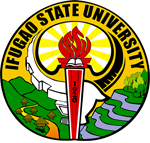

News and Publications
GIAHS Media Center
About IFSU GIAHS Center
The Center for the Ifugao Rice Terraces as a Globally Important Agricultural Heritage Systems (GIAHS) was established by virtue of Policy – Guidelines No. 66 – 2014 on January 19, 2015. This was approved by the Board of Regents through Resolution No. 451 s. 2014 dated November 19, 2014. With this, the Center became part of the university’s organizational structure.
The Center is tasked to conduct focused research and extension activities towards the conservation of the Ifugao Rice Terraces; facilitate cultural restoration and agricultural and biodiversity revitalization; document, identify, and assess indigenous agricultural and biodiversity systems and technologies; and create national databases and publications concerning the Ifugao Rice Terraces system. Moreover, it adheres to the targets and measures of the university’s Division of Research, Development, Extension, and Training as one of its centers. The Center implements four (4) components that function with its current projects, programs, and activities.
1) International Innovation Center for Indigenous Studies that caters to indigenous studies innovations and knowledge co-creation in the university and with external partners such as the conduct of researches, development of learning resources, data management and transformation.
2) Capacity Building Programs hosts training programs and mentoring. The Center is hosting two (2) projects: the Strengthening the Twinning between GIAHS Designated Sites, Ifugao Rice Terraces (IRT) and Noto’s Satoyama-Satoumi (NSS), for Sustainable Development through the Ifugao Satoyama Meister Training Program that capacitates stakeholders of the Ifugao Rice Terraces for its conservation and the Center for Taiwan-Philippines Indigenous Knowledge, Local Knowledge, and Sustainable Studies (CTPILS) through the Ifugao Indigenous Knowledge Educators Training Program and IFSU Indigenous Knowledge Educators Training Program that capacitates educators on indigenous peoples and or indigenous knowledge education.
3) Heritage Resource Center establishes a library of literature resources on Ifugao natural and cultural heritage. It is also the Center’s arm in knowledge popularization through the newsletter GIAHS Bulletin. Moreover, it serves as the component for the development of new learning resources across media such as print and audio-visual.
4) Local and International Linkages sustains the partnership of IFSU to the local and international community on collaborative research, scholastic exchange, extension programs, and partnerships relative to natural and cultural heritage promotion and conservation.
***GIAHS are outstanding landscapes of aesthetic beauty that combine agricultural biodiversity, resilient ecosystems and a valuable cultural heritage. Located in a specific sites in the world, they sustainably provide multiple goods and services, food and livelihood security for millions of small-scale farmers (Food and Agriculture Organization of the United Nations).
The Ifugao Rice Terraces system was designated as GIAHS site in 2011 by the UN FAO and as World Heritage Site in 1995 by UNESCO. It is also resembles as a satoyama-like landscape and represents as socio-ecological production landscape. Satoyama is a Japanese term for landscapes that comprise a mosaic of different ecosystems types including secondary forests, agricultural lands, irrigation ponds and grassland, along with human settlements.